Related Research Articles

Brân the Blessed is a giant and king of Britain in Welsh mythology. He appears in several of the Welsh Triads, but his most significant role is in the Second Branch of the Mabinogi, Branwen ferch Llŷr. He is a son of Llŷr and Penarddun, and the brother of Brânwen, Manawydan, Nisien and Efnysien. The name "Brân" in Welsh is usually translated as crow or raven.
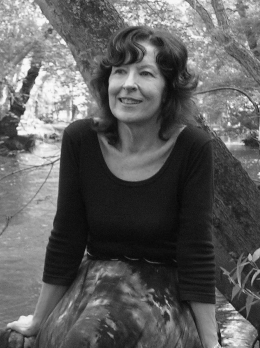
Sharon Kay Penman was an American historical novelist, published in the UK as Sharon Penman. She was best known for the Welsh Princes trilogy and the Plantagenet series. In addition, she wrote four medieval mysteries, the first of which, The Queen's Man, was a finalist in 1996 for the Best First Mystery Edgar Award.

Welsh writing in English, is a term used to describe works written in the English language by Welsh writers.

Kate Roberts was one of the foremost Welsh-language authors of the 20th century. Styled Brenhines ein llên, she is known mainly for her short stories, but also wrote novels. Roberts was a prominent Welsh nationalist.

Harlech is a seaside resort and community in Gwynedd, north Wales and formerly in the historic county of Merionethshire. It lies on Tremadog Bay in the Snowdonia National Park. Before 1966, it belonged to the Meirionydd District of the 1974 County of Gwynedd. Its landmark Harlech Castle was begun in 1283 by Edward I of England, captured by Owain Glyndŵr, and in the 1480s, a stronghold of Henry Tudor. Once on a seaside cliff face, it is now half a mile inland. New housing has appeared in the low town and in the high town around the shopping street, church and castle. The two are linked by a steep road called "Twtil". Of its 1,447 inhabitants, 51 per cent habitually speak Welsh. The built-up area with Llanfair had a population of 1,762 in the 2001 census, over half of whom lacked Welsh identity, and the electoral ward which includes Talsarnau 1,997 in the 2011 census. The estimate in 2019 was 1,881.
Francis David Ormsby-Gore, 6th Baron Harlech, was a peer in the United Kingdom. In 1985 he inherited the property in Wales and the Harlech title from his father.
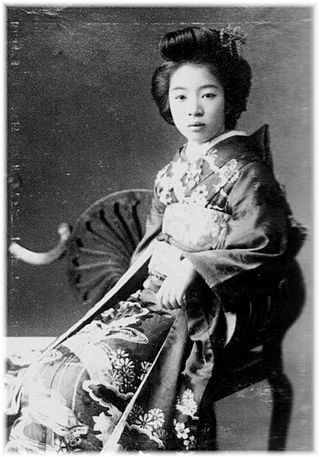
Mari Mori was a Japanese author, best known for writing male homosexual romances.
Catherine A. Merriman is a British novelist, short-story writer and editor who has published five novels and three short-story collections. Her work often addresses the experiences of women. Her first novel, Leaving the Light On (1992), won the Ruth Hadden Memorial Award; her other works include the novels Fatal Observations (1993) and State of Desire (1996); the short-story collections Silly Mothers (1991), shortlisted for the Wales Book of the Year, and Getting a Life (2001); and the edited collection Laughing, Not Laughing: Women Writing on 'My Experience of Sex' (2004), which won an Erotic Award. Born in London, she has lived in Wales since 1973, and is often considered to be a Welsh author.

Louise Welsh is an English-born author of short stories and psychological thrillers, resident in Glasgow, Scotland. She has also written three plays, an opera, edited volumes of prose and poetry, and contributed to journals and anthologies. In 2004, she received the Corine Literature Prize.
Henry Lewis CBE was Professor of Welsh Language and Literature at the University College of Swansea from 1921 to 1954.

Zoë Strachan is a Scottish novelist and journalist. She also teaches creative writing at the University of Glasgow.
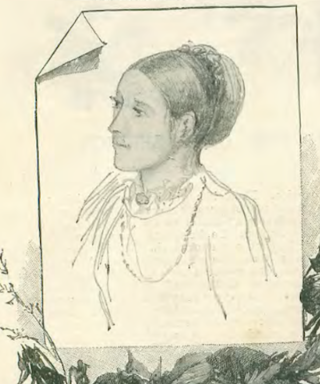
Anne Beale was a popular English novelist and poet based in Wales. Her poetry, novels and stories appeared in print for over 50 years in her lifetime: "an unusually long career as an author". She was born and educated in Somerset and started a career as a governess. In 1841, she settled in Carmarthenshire. She started writing to supplement her teaching income, but she later earned enough to write full time.
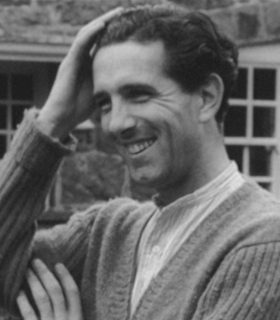
Meredydd Evans, known colloquially as Merêd, was a collector, editor, historian and performer of folk music of Wales. A major figure in Welsh media for over half a century, Evans has been described as influencing "almost every sphere of Welsh cultural life, from folk music and philosophy to broadcasting and language politics".
Hilda Campbell Vaughan was a Welsh novelist and short story writer writing in English. Her ten varied novels, set mostly in her native Radnorshire, concern rural communities and heroines. Her first novel was The Battle to the Weak (1925), her last The Candle and the Light (1954). She was married to the writer Charles Langbridge Morgan, who had an influence on her writings. Although favourably received by her contemporaries, Vaughan's works later received minimal attention. Rediscovery began in the 1980s and 1990s, along with a renewed interest in Welsh literature in English as a whole.
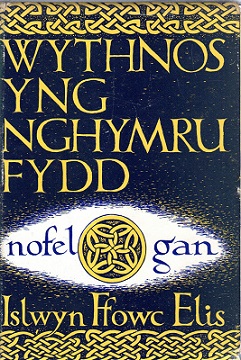
Wythnos yng Nghymru Fydd is a science fiction novel in the Welsh language written by Islwyn Ffowc Elis and published by Plaid Cymru in 1957.
Deborah Kay Davies is a Welsh poet, writer, and educator. She received her PhD from Cardiff University. In 2009 she received a Wales Book of the Year for English-language for the short story collection Grace, Tamar and Laszlo the Beautiful (2008). Her novels are True Things About Me (2010) and Reasons She Goes to the Woods (2014).
Ysgol Ardudwy is a bilingual secondary school for 11–16 year olds at Harlech, Gwynedd, Wales. It serves the seaside communities of Penrhyndeudraeth, Harlech, Abermaw (Barmouth) and nearby villages. It had 316 pupils on the roll in 2022.

Manon Steffan Ros is a Welsh novelist, playwright, games author, scriptwriter and musician. She is the author of over twenty children's books and three novels for adults, all in Welsh. Her award-winning novel Blasu has been translated into English, under the title of The Seasoning. In May 2021 she was described as "arguably the most successful novelist writing in Welsh at the moment". In June 2023 she won the Yoto Carnegie Medal for The Blue Book of Nebo, her English translation of her novel Llyfr Glas Nebo.
Mari Griffith was a Welsh radio announcer, as well as a singer, presenter, independent producer and novelist later on in life.
Rhiannon Davies Jones was a Welsh historical novelist, lecturer and Welsh nationalist who wrote in Welsh. Educated at University College Bangor, she won two prizes for short novels, two Prose Medals at the National Eisteddfod of Wales and the crown at the 1973 Anglesey Eisteddfod. Jones published ten novels with her works covering fictional diaries, her political beliefs and responses to political events, and Welsh kings and princes.
References
- 1 2 3 User Fusion Ltd (14 January 2019). "Wales Literature Exchange. Retrieved 14 January 2019". waleslitexchange.org. Retrieved 14 January 2019.
{{cite web}}:|author=has generic name (help) - 1 2 WalesOnline (14 January 2019). "Mari Strachan on writing late in life". Wales Online. Retrieved 14 January 2019.
- 1 2 3 BookBrowse (14 January 2019). "Mari Strachan author interview". bookbrowse.com. Retrieved 14 January 2019.
- ↑ "Dead Man's Embers – Mari Strachan – 9781847675323 – Allen & Unwin - Australia". allenandunwin.com. 14 January 2019. Retrieved 14 January 2019.